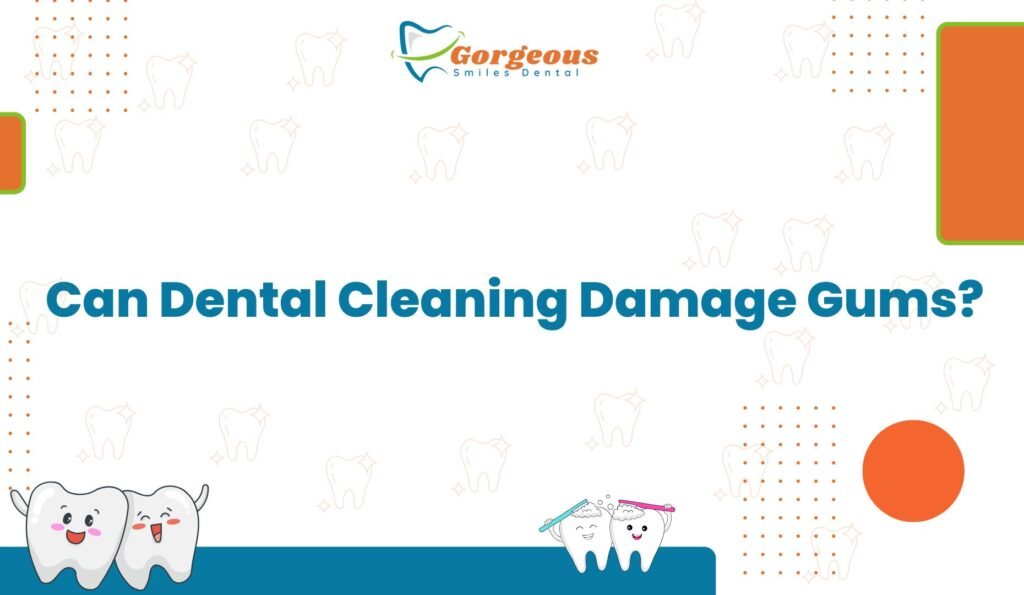Can Dental Cleaning Damage Gums?

Professional dental cleanings are a vital part of oral health care. They remove plaque, tartar, and bacteria that daily brushing and flossing cannot. However, many patients worry whether dental cleanings can harm their gums, especially if they already have sensitive gums, gum disease, or gingivitis. This article explores the facts, addressing common concerns and explaining how teeth cleanings protect rather than damage gums.
Why Dental Cleanings Are Necessary
Dental cleanings are designed to maintain gum health and prevent disease. Without them, plaque hardens into tartar (calculus), which irritates gum tissue and leads to periodontal disease.
Benefits of Regular Dental Cleanings
- Removes tartar buildup
- Prevents gingivitis and gum disease
- Reduces risk of tooth loss
- Improves overall health by reducing oral bacteria
Regular professional cleanings keep gums strong and healthy rather than damaging them.
Can Dental Cleaning Damage Gums?
The short answer is no—when done correctly, dental cleanings do not damage gums. However, patients may experience temporary tenderness, swelling, or bleeding, especially if there is already inflammation or tartar buildup.
Why Gums May Feel Sore After Cleaning
- Existing gum disease can cause sensitivity
- Removing tartar from beneath the gumline may cause temporary irritation
- Infrequent dental visits make cleanings more uncomfortable
These effects are mild and short-lived, usually resolving within a few days.
Understanding Gum Recession and Cleanings
Some patients fear that gum recession is caused by cleanings. In reality, recession is usually due to gum disease, aggressive brushing, or genetics. Dental cleanings may make recession more noticeable because tartar that was covering the gumline gets removed.
How to Protect Against Gum Recession
- Brush with a soft-bristled toothbrush
- Avoid overly aggressive flossing
Maintain regular dental visits to prevent disease progression
The Role of Dental Hygienists in Gum Care
Dental hygienists play a key role in protecting gum health during cleanings. They are trained to use specialized tools that remove tartar without harming gum tissue.
Why Dental Hygienists Poke Gums
Hygienists use a periodontal probe to measure pocket depth—the space between the tooth and gum. This helps detect early signs of gum disease. While this may feel uncomfortable, it does not damage gums.
Deep Cleaning and Gum Health
For patients with periodontal disease, dentists may recommend a deep cleaning (scaling and root planing). This involves cleaning beneath the gumline to remove bacteria and tartar.
Side Effects of Deep Cleaning
- Temporary gum soreness
- Minor bleeding
- Tooth sensitivity
These side effects are normal and temporary, not signs of permanent gum damage.
Healing After a Dental Cleaning
Gums typically heal quickly after a cleaning.
How Long Until Gums Heal After Deep Cleaning?
Mild soreness may last a few days, while full healing may take 1–2 weeks, depending on gum health.
Tips for Faster Healing
- Use warm saltwater rinses
- Avoid hard, crunchy foods for a few days
- Brush gently with fluoride toothpaste
Follow your dentist’s aftercare instructions
Preventing Gum Damage During Cleanings
Dental cleanings are safe when performed by professionals. Still, patients can take steps to protect gum health.
Best Practices for Gum Safety
- Visit your dentist every six months
- Maintain consistent at-home care
- Inform your dentist about any gum sensitivity
Avoid skipping appointments, as this allows tartar to build up
What Dentists Can Do That Hygienists Can’t
While hygienists handle routine cleanings, some procedures require a licensed dentist.
Dentists vs. Hygienists in Gum Care
- Dentists diagnose conditions, perform surgeries, and provide complex treatments
- Hygienists focus on preventive care and routine cleanings
This distinction ensures gums are protected through professional oversight.
Can Dental Cleaning Damage Gums in the Long Term?
No—long-term gum damage is not caused by professional cleaning. In fact, avoiding cleanings is what leads to irreversible gum disease. Cleanings help prevent the inflammation that destroys gum tissue and bone.
Conclusion
Dental cleanings are essential for maintaining healthy gums. While mild sensitivity, tenderness, or bleeding may occur after a cleaning, these effects are temporary and a normal part of gum recovery. Professional cleanings protect against gingivitis, gum disease, and tooth loss, making them critical for long-term oral health.
If you are concerned about gum sensitivity or have avoided dental visits due to fear of discomfort, consult an experienced Dentist in Springfield, MA to ensure safe, professional care.
FAQs
Can dental cleanings cause gum recession?
No, cleanings don’t cause recession. They may make existing recession more noticeable by removing tartar.
What are the side effects of dental cleaning?
Mild soreness, bleeding, or sensitivity that usually lasts only a few days.
How long until gums heal after deep cleaning?
Most patients heal within 1–2 weeks.
Can a dental hygienist damage gums?
No, they are trained to clean safely. Temporary irritation may occur but does not cause damage.
Why do dental hygienists poke your gums?
To measure pocket depth and check for gum disease.
Can you get sued as a dental hygienist?
Yes, but only if negligence occurs, which is rare due to strict training and professional standards.
How to avoid injury as a dental hygienist?
By using proper technique, tools, and maintaining ergonomic posture.
Why do dental hygienists not get benefits?
Employment structures vary; some work part-time or in clinics without full benefit packages.
What can a dentist do that a dental hygienist can’t?
Dentists can diagnose, prescribe, perform surgeries, and provide advanced restorative treatments.
Ready to book an appointment?
Book a consultation today or make an appointment using our convenient online appointment scheduler.

We’re committed to your safety.
Enjoy the flexibility of paying through monthly payments.

A discount plan available to keep you and your family healthy.
Others Article
At our dental practice, we prioritize compassion and empathy toward our patients. Please read our blog and articles for tips on maintaining oral health and learn more about our commitment to providing exceptional dental care with a personal touch.
